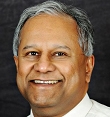The need for diversity in the legal profession was the flavour of the evening at the South Asian Bar Association of Toronto’s (SABA) awards gala on Thursday.
Diversity on legal benches boosts public confidence in the administration of justice, said federal Liberal leader Justin Trudeau, who was the keynote speaker at the event. Justice is best served “when the public sees itself reflected on legal bars,” said Trudeau, weighing in on the topic of judicial appointments that has been in the news this week.
“Achieving diversity on the bench becomes ever more challenging when government refuses to collect and share the data needed to assess progress. Securing public trust in the judiciary is similarly compromised when the selection process is shrouded in secrecy.”
Trudeau was weighing in on the appointment earlier in the day of Suzanne Côté to the Supreme Court of Canada that brought the number of women judges on the highest court to four. The court had earlier rejected Prime Minister Stephen Harper’s choice of Marc Nadon, saying he didn’t meet its eligibility criteria.
“I unreservedly congratulate Suzanne Côté’s appointment … to replace Justice [Louis] LeBel, but the process was unnecessarily opaque,” Trudeau said. “Mr. Harper appointed an excellent justice and finally restored the gender balance in the court that existed under the Liberal government. The result is excellent, the process is flawed.”
No lip service, please
Trudeau said that at a time “when we can track in real time the number of people watching cat videos on YouTube the fact we know so little about those selected to administer justice is absurd.” He said each year courts in the United Kingdom publish a complete breakdown of judicial diversity statistics including gender, ethnicity and age. “This isn’t a secret document only those who know how to execute freedom of information requests can acquire. It’s posted every year on their web site.”
The opaque process Trudeau referred to tracks only gender. While we know that as of November 1, 2014 female judges account for 381 out of 1,110 federal judges, the Office of the Commissioner for Federal Judicial Affairs does not track the numbers of visible minority appointees. The Canadian Bar Association, in an assessment of the procedures for the appointment of judges, has identified the lack of data about representation of visible minorities in the judiciary as a major barrier to progress.
In her address, Jayashree Goswami, SABA president, called for meaningful diversity in the legal sector that was not about tokenism. “Lip service is no longer acceptable,” and there is an urgent need to level the playing field and erase the stereotype that diverse candidates lack merit, said Goswami. On the often heard defence that selection has to be merit-based, she said such arguments imply that “merit rests largely with a particular race and gender.”
On the often heard defence that selection has to be merit-based, Jayashree Goswami said such arguments imply that “merit rests largely with a particular race and gender.”
Systemic change
In her closing remarks, Janet E. Minor, treasurer of the Law Society of Upper Canada, said SABA gave her organization priceless advice in the writing of its consultation paper on Developing Strategies for Change: Addressing Challenges Faced by Racialized Licensees.
The paper provides comprehensive information and describes the statistical data, research results and anecdotal evidence that the Law Society has gathered and received as part of its ongoing efforts to promote equity, diversity and inclusiveness in Ontario’s legal profession.
“By studying and addressing the realities faced by racialized licensees, the Law Society is leading the way for systemic change that will help the legal profession better reflect the diverse public it serves,” said Minor.
The Law Society paper show that, despite the significant increase in the number of racialized licensees in the last 20 years, racialized lawyers and paralegals continue to face challenges — many of which are distinct from the challenges faced by their non-racialized peers. For many, discrimination is also a feature of daily life.
…despite the significant increase in the number of racialized licensees in the last 20 years, racialized lawyers and paralegals continue to face challenges — many of which are distinct from the challenges faced by their non-racialized peers.
“We are taking the findings from this extensive research very seriously and that is why we have included several detailed questions in the consultation paper for further discussion and input,” she said. “We want to fully engage the professions and the public in considering options to address the challenges faced by racialized licensees.”
Award winners
On a more positive note, Ranjan Agarwal, a partner at Bennet Jones LLP and a director at SABA, has been quoted as saying that the legal profession is beginning to treat diversity as a serious issue. “Law firms themselves have realized why diversity is important,” he said. “It creates better teams and ensures that they can recruit the best and the brightest.”
A reflection of this change was evident when BMO Financial Group’s General Counsel Simon Fish was awarded SABA’s inaugural Diversity Award for demonstrating exemplary commitment to the promotion and recognition of diversity in the legal profession.
Four South Asian lawyers who have achieved excellence in their areas of practice or have exceptionally contributed to the profession were also recognised at the event. They are: Bindu Cudjoe, BMO Financial Group; Sanjeev Dhawan, Hydro One Networks; Sunil Mathai, Ministry of the Attorney General; and Awanish Sinha, McCarthy Tetrault LLP.
Ranjit is a Toronto-based writer with interest in Canadian civic affairs, immigration, the environment and motoring. Maytree and Al Jazzera English alumnus.





